A Walk in Brooklyn Bridge Park with Delia Cai
"Amazing things can happen to you, but if you don’t share them with other people—if you can’t share them with other people—then a good amount of that joy is not quite there."
“Do you want a seltzer?”
Delia Cai is sitting on a park bench at the Pier 6 entrance of Brooklyn Bridge Park, a Deez Links tote bag slung over her shoulder. She stands up and pulls a cold can of LaCroix from her bag, which I gratefully accept. I was running late, so I skateboarded through Brooklyn to meet her and it shows. I wipe the sweat from my face. We don’t know it yet, but today will be one of the last really hot days of the year.
I scoop my skateboard up under my arm and we walk into the park, past children chasing each other around a playground. I smile. During the pandemic, Delia posted videos to her Instagram stories of a group of children that used to walk by her apartment daily. I never mentioned it to her, but those short videos—filled with children laughing, all of them holding on to a little rope so they didn’t get separated from their group—was one of those small, insignificant things that somehow helped me get through last year. A little slice of virtual joy.
We walk along the East River, down past Pier 4 Beach, the Manhattan skyline shimmering in front of us as the sun begins to swing low in the sky. Every now and then we look over our shoulders at the beautiful brownstones of Brooklyn Heights. A few bicyclists rush past us as we talk about college, journalism, how Delia designed the logo for Deez Links using MS Paint, and yes—those cute kids from her Instagram stories. After we walk up and down the length of a few piers, making our way closer to the Brooklyn Bridge, we eventually turn around and head back to Pier 6, where we stop at Pilot, an old tall ship that has circumnavigated the world twice, but is now docked and serves as a seasonal oyster bar.
The sun begins to set as we each order a drink and a lobster roll. We continue talking, and every moment you think the evening sky is as colorful as it possibly can be, it turns a little brighter.
Isaac Fitzgerald: You were recently hired as the Senior Vanities Correspondent for Vanity Fair. What does that entail?
Delia Cai: So a fun piece of Vanity Fair history is that Tina Brown, and I know this from reading The Vanity Fair Diaries over the summer—which I loved, by the way—one of the first things that she did when she was brought on at Vanity Fair was reconceive the whole front of book section and call it “Vanities.” Brown wanted Vanities to be Vanity Fair’s version of The New Yorker’s Talk of the Town section. Little tidbits commenting on the culture.
[Editor’s note: If you’re wondering what “front of book” means, it’s the front section of a magazine, usually filled with shorter pieces that touch on current culture or fashion.]
So Vanities at Vanity Fair is everything that is literally front of book—along with fashion and beauty sections. Online that translates into a blog-y style section sensibility—a more immediate metabolism of everything that’s going on in the moment, whether it’s culture or celebrity or fashion. It’s a real mix of what people are talking about.
I: That seems like a perfect continuation of what you do with your newsletter, Deez Links.
DC: I had a conversation with Matt Lynch, my editor, when we were talking about the role because at the time I had major imposter syndrome and my thinking was, “This is a newsletter where I talk to friends in media and it’s, well, it’s about media gossip. Inside baseball—or not even inside baseball, more like small potatoes. Why would Vanity Fair be into that?”
But Matt helped me see the bigger picture. Looking at how the content we consume—what we read, what we hear about, what we gossip about, what we discourse about—what that says about both us and the culture at large. What that says about where we're going as a society.
I: That’s always an exciting moment. When someone can point out to you,
“Hey, this thing you've been doing that you think of as ‘small fries’ is actually ‘big fries.’”
DC: Exactly.
I: When did you start Deez Links? Right out of college?
DC: I graduated in 2015 and then started as a fellow at Atlantic Media in July. So I started the newsletter that following February, in 2016. All of us were kind of panicking because our fellowship was coming to an end and everyone was basically shitting themselves. “Who’s getting hired here? Who’s getting a job elsewhere? How are we going to get real jobs now?” In a way I think the newsletter was born a bit out of that frustration. That moment of, “What now?”
Also, my fellowship was on the business side, not editorial. I'd seen my friends on the editorial side getting published already, so I was feeling like, “Oh man, I'm way behind.” Friends from school are getting these cool editorial jobs and getting their names out there. Building their writing careers. And I'm working on these corporate memos and decks that maybe five people see. So I wanted to start writing something, to get into that habit of writing and publishing. Even if it was just for me, or simply a funny email for a bunch of my friends every day.
I: Which quickly grew into more than a bunch of your friends. Is that what you went to school for? Did you always want to be a writer?
DC: I went to school because I really liked magazines. I wanted to be a magazine editor. I grew up in a small town outside of Peoria, Illinois. Central Illinois. Farmland. We had a Drive Your Tractor to School Day. So in general my family—and the environment I was growing up in—wasn’t the most news literate. Growing up I remember having Highlights for Kids, or Nickelodeon Magazine, but we weren’t, say, a Sunday New York Times family.
But then I started going to the library and checking out old, back issues of Vogue and other magazines and simply poring over Every. Single. Caption. I remember being so hungry for any kind of information—I had the internet but it was still dial up, and there were rules around it—so I would be in the library looking for any signs of culture from the world outside of Dunlap, Illinois.
And then, once I was able to be on the internet—in middle school and then even more in high school—that was amazing.
I: That changed things for you?
DC: Very early on I discovered this website called Quizilla. In a way, what Tumblr was to most people, or what fanfiction.net was to most people, that’s what Quizilla was to me. It was sort of a proto-BuzzFeed. Anyone could make an account and then you made quizzes—or you could publish a story—and then other community members would rank your work. Every day I would check the leaderboard to see whose quiz or whose story was the most popular. It was almost entirely all middle school girls, but I was like, “Oh my god, these are my people!” That quickly turned into me writing fan fiction. I would write these long, 70-chapter serialized stories on Quizilla—working on them night after night. That was my entire seventh grade and my entire eighth grade, simply writing every night and publishing my work online.
I: So when do you move to New York City?
DC: The fellowship I had with Atlantic Media was in Washington, DC. I did end up getting a job with them—I was hired on to the marketing team—and that’s when I moved to New York, in March of 2016. I had like a week, maybe two, to find a place to live.
So I found a place through Facebook. A tiny room in an apartment that I shared with two other women in Cobble Hill. I didn’t know anything about Cobble Hill. I didn’t know anything about Brooklyn. Or New York, honestly. But on one of my first nights living in that tiny room I said to myself, “I wonder how close to the water I am?” Because I'm a Midwesterner. So even now I'm still like, “Ooooh, I'm on an island!” So I left the apartment and strolled downhill until I wound up at this park. It was this kind of classic movie moment. I was walking through the neighborhood and then, “Oh my god, look at that skyline.”
I’d heard of Central Park. I’m pretty sure I even knew Prospect Park. But I hadn’t heard of Brooklyn Bridge Park, and I absolutely fell in love.
I: So you grew up poring over magazines at your local library, and now you’re writing for Vanity Fair. Are you, to put it simply, stoked?
DC: I am. It still feels a bit wild. I think there was a point, for a really a long time—even after I started the newsletter—where I was like, “Ok. Maybe it turns out that I'm simply going to be a really good booster of other people's work.” Which is great. I love doing that. I love highlighting really good work by other people, and helping draw attention to it.
I: Being a cheerleader. I also identified with being a cheerleader first and foremost for a very long time. I feel you.
DC: Absolutely. Because it’s so fun and so rewarding to highlight the work of other people. But there is always this sense of, “Am I being a cheerleader because I think I can’t actually do it myself?”
I: Which obviously turned out not to be the case. Because now you have your newsletter. After working on the business side in media you’ve now jumped to the editorial side. And you’ve sold your book. Congrats! Can you tell us about it?
DC: The working title is Central Places. I love the Hallmark holiday movie trope of, you know, city girl comes back to her small town. Chaos ensues. So the book is about a woman who grew up in the Midwest with Chinese immigrant parents. She's moved to New York and now she’s bringing her fiancé, who is a white woke Brooklyn dude, back with her for the holidays to meet her parents. And the joke is that he's totally down with the Asian family, but he cannot square with the whole, “Oh, we're going to Panera for bagels” aspect of it. So it’s a commentary on that type of snobbery.
I: He can’t deal with the Midwest-ness of it all. The suburban, basic-ness of it all.
DC: Yeah, so it’s a coming of age story built around that. A book that I read recently that I really loved was Such a Fun Age by Kiley Reid, so I was definitely thinking about that in terms of what you can get away with regarding highbrow/lowbrow in a novel, and also in terms of writing a very plot-driven story.
I: The protagonist of your novel is the daughter of Chinese immigrants. Did you also grow up in an immigrant household?
DC: I did. My parents went to grad school at the University of Wisconsin and then stayed in the Midwest. Eventually they became engineers at Caterpillar.
I: Was growing up in Dunlap, Illinois as the daughter of Chinese immigrants tough, or did you feel pretty well-acclimated?
DC: It was a little bit of both. We did have a Chinese community in Peoria. I went to language school. Growing up, my best friend was Chinese and her parents and my parents were friends. At the same time, going to school, it was totally a game of “How well can you assimilate?” And that became the only thing on my mind.
It wasn't until I got to New York, honestly—after working at Atlantic Media I got a job at BuzzFeed—and it wasn’t until I made a lot of Asian friends in media working there, when I felt we could all finally begin to unpack that. Before that, it felt like we were all just trying to sneak through the door, you know?
When I lived in DC, that was my first time feeling like a Midwesterner. People could tell I wasn’t from the coast. But it wasn’t until I got to New York, and honestly when I worked at BuzzFeed, where I was working with people my own age who were in media who were also Asian—some from the coasts, some from the Midwest. That’s where I truly got a sense—going to Asian comedy shows, meeting other Asian writers and journalists—of Asian American Culture.
I: So that whole time, though—you’re working at Atlantic Media, you’re working at BuzzFeed, you’ve moved to New York City—you’re publishing your newsletter, Deez Links. Why that format? Did you simply love newsletters? Were you a big Ann Friedman fan?
DC: That’s funny you bring up Ann. I went to Mizzou and Ann is a Mizzou grad also. So she was a legend. When we were students we looked at her and said, “That’s the way you do it.” We had all these professors teaching us Tom Junod and classic journalism, but at the same time we were looking at Ann Friedman and saying, “That’s the blueprint.” So absolutely I was thinking about Ann Friedman. Also Rusty Foster, whose Today in Tabs I read religiously. Even when I was in DC, before I came to New York, I learned so much from Today in Tabs.
They also encouraged us to blog while we were at school. And use social media. I’m sure our professors hoped that we would all be blogging about our thoughts on the industry, or best practices, but of course we simply wrote gossip about each other and thinly veiled essays about who was fighting with who. In a way, it really prepared me for working in New York media.
I: Did you make a lot of friends through social media, when you were at school?
DC: Not just in school. It’s a really good way to meet people, especially when I first moved to New York. It’s always awkward, a bit, making the jump from online friend to meeting up in person, but so many of my friendships have been made that way.
I: During the pandemic, you posted these adorable kids that you could see from your apartment window to your Instagram stories. They were so cute, and so small, and in general they made me feel good during a shitty time. So I wanted to ask, what got you through the pandemic?
DC: Oh my god. Those kids! Ok, so there’s a learning center, or a preschool, across from my building. And every day at exactly 12:30pm the kids go for a little walk, and they walk right by my apartment building. They’re all three or four years-old, and they’re all wearing these high visibility safety vests, holding on to a little rope, and singing. It was so pleasant to look forward to that every day. Every day at 12:30pm, “There they are.”
For 99% of the pandemic I lived alone. It was so, so lonely. Plus it brought up a lot of childhood stuff. This feeling of, “I’m never going to get out of this. I’m stuck here.” All of a sudden I was alone again—just like when I was a kid at home in my parents' computer room—alone and trying to make connections over the internet. It was the same feeling. “Nothing is going to change in my life for awhile.”
But luckily I had already faced that, you know? When I was a kid. I could say to myself, “You’ve been alone—stuck in a room with nothing but a computer—before, and you didn’t totally disintegrate then. So you’re going to be fine.” Also, I know more about self care now than I did when I was kid. So I did my damnedest not to spiral too hard, and I took it day by day. “Tomorrow? Let’s not worry about it. Let’s focus on getting through today.”
That, and a lot of TV.
I: Did you ever think about leaving the city? Maybe going back home?
DC: No.
I: Is New York home, in a way?
DC: I love it here. I would love to be here forever.
I: So you live in New York, you’re working in the industry you want to be working in, your career is going well, and you sold your book. In way, it seems like you’re living out a lot of those dreams you had in that library in Dunlap, Illinois. What are the new dreams?
DC: What I do seems so impenetrable to my parents. They feel, “Well, we don’t know anyone who’s done that.” So—while they were always supportive—I don’t know if they completely understood the plan. If they truly saw what I was going for. Selling the book, in a way, has changed that. That’s a tangible thing, that I sold, so they understand that. But still…
In a way I think it’s very beautiful. I can say to them, “I know you don't understand my life, but this is what you moved here for. Right? So I can do shit that you don't completely understand.” And to be honest, both of us—neither them nor I—can believe that it's happening.
I: That’s amazing.
DC: I wasn’t expecting to get emotional.
I: So what are the new dreams? And if you don’t want to speak them aloud, that’s ok. Some dreams are meant to be held in your heart, and not shared with people.
DC: My dreams are maybe a little different now, especially because of the last year. Earlier today I was thinking about when I travel again, “Where do I want to go?” I’m not a huge wanderlust person, but I would really love to end up knowing Japan really well, and end up knowing Italy really well. Those are two food-based places that I would love to keep taking trips to, over and over again.
The last big trip I took before the pandemic was a solo trip to Rome and Cinque Terre. And it was simply the best eight days. I was thrilled by it. That feeling of, “Oh my god, that was really nice.”
I also really want to get good at pottery. I took a wheel throwing class and I was so bad at it that now I’m determined. I left thinking, “Wow, I'm angry and humiliated. But now I have a new lease on life. I want to learn how to make a cylinder.”
To put it another way, I want to spend my time not hunched over a computer, but hunched over something else, trying to make it perfect.
I’d also like to meet a partner. To put down roots in New York in a real way. I have had some career success recently, but like I said, the pandemic was so, so lonely. And that’s sort of weird to square. Because what’s happening is wonderful, but the inability to really share it with people in an old, analog kind of way—a simply real life sort of way—drove home the fact that amazing things can happen to you, but if you don’t share them with other people—if you can’t share them with other people—then a good amount of that joy is not quite there.
So really, those are the new dreams. Saying to myself, “Ok, the career is going well. Let’s fill out the rest of your life.”
Oh! And I maybe want a dog.
Delia heads out to meet a friend. They’re going to see Atsuko Okatsuka perform at The Bell House.
I stay on the tall ship and order another beer. Thinking about how we all spent so much time inside, hunched over a computer, reaching out, trying to make connections. It feels good to be staring out across the East River, at all the buildings of Manhattan, the office lights twinkling in the early evening. New York City is very much alive. Brooklyn Bridge Park is filled with people. When I go to take a photo of the sunset from the bow of this newly discovered boat-turned-oyster-bar, I have to wait as numerous other people do the same.
“How long will you be open for?” I ask the bartender, settling my tab.
“We’ll be here through the end of October,” she tells me. “Hopefully it’ll stay warm.”
I walk up the metal gangplank and back onto dry land. It might be colder towards the end of October, but I make a promise to myself to come back to Pilot and get a drink before they close down for the season.
The night has cooled, but I’m still comfortable in a t-shirt. I step onto my skateboard and begin to push, rolling past docked cargo ships and out of the park, towards home.




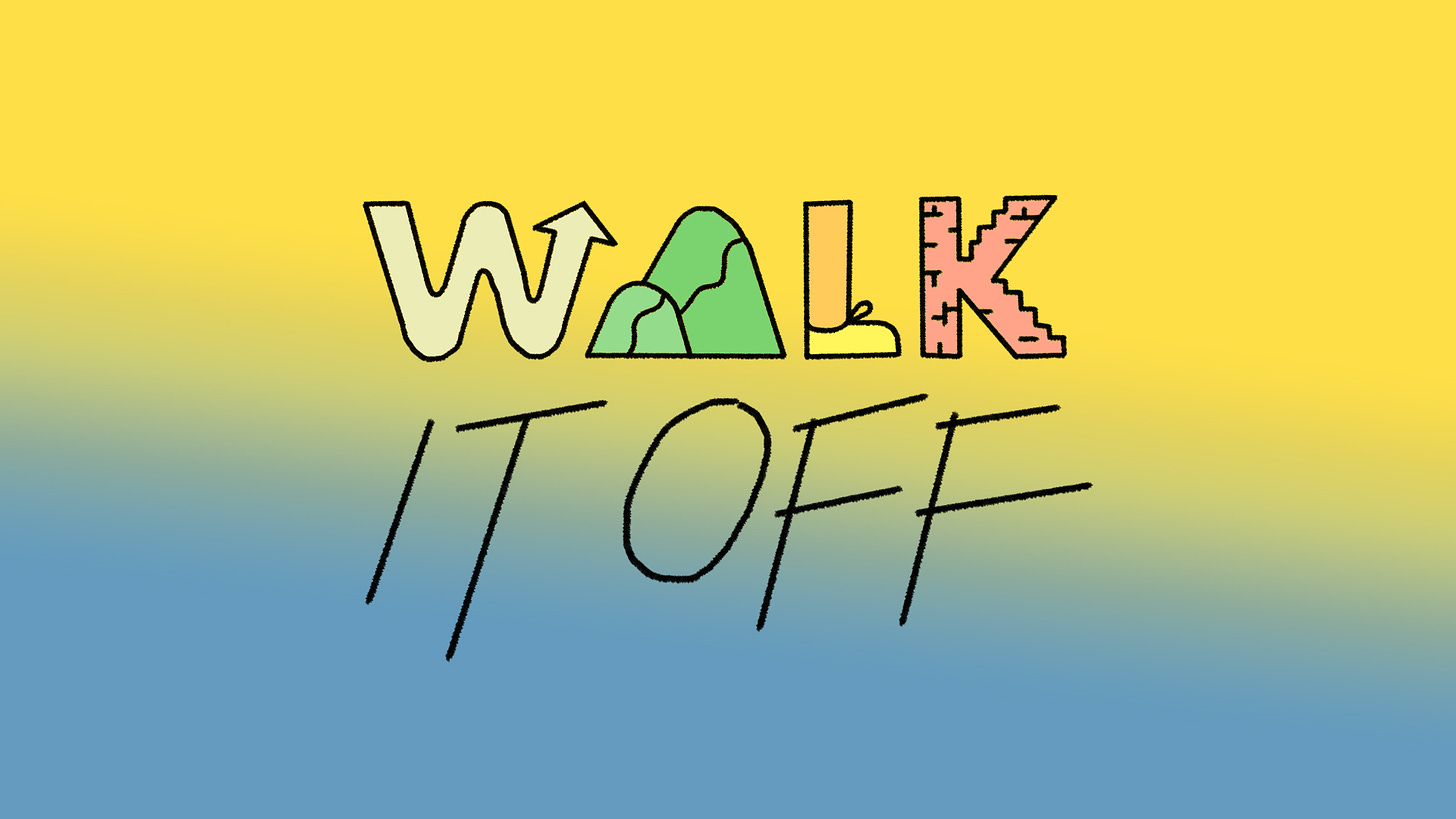
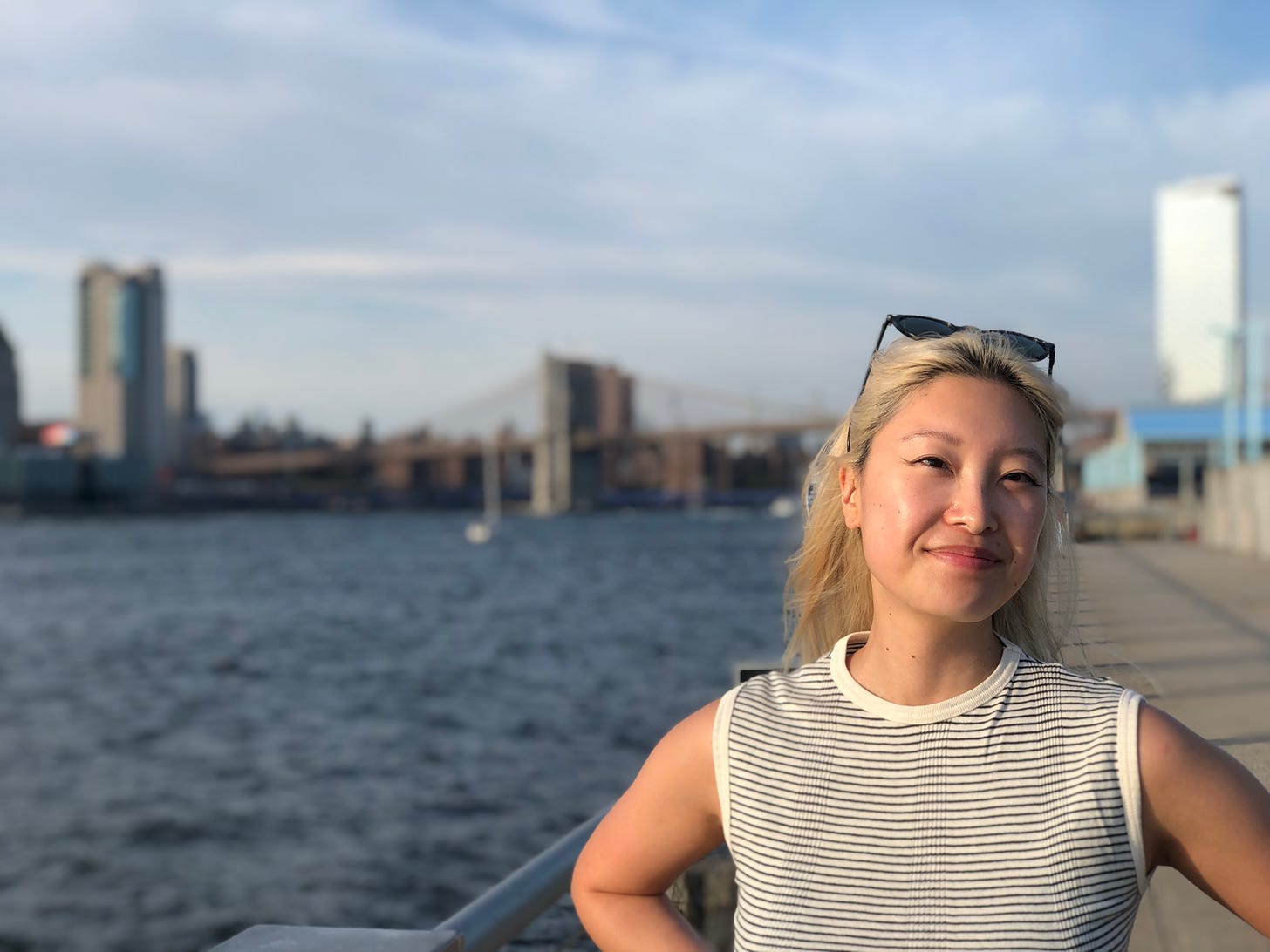
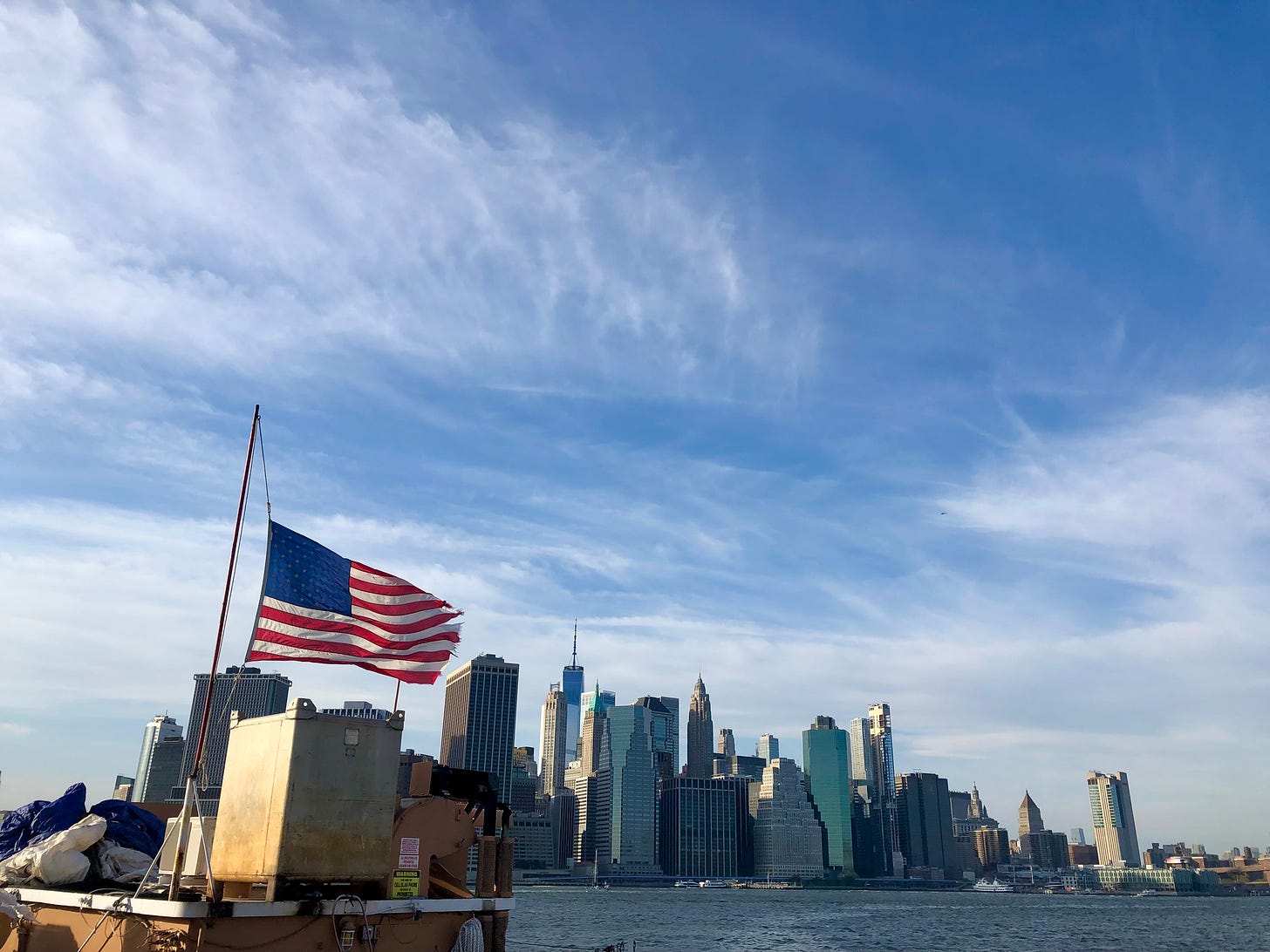


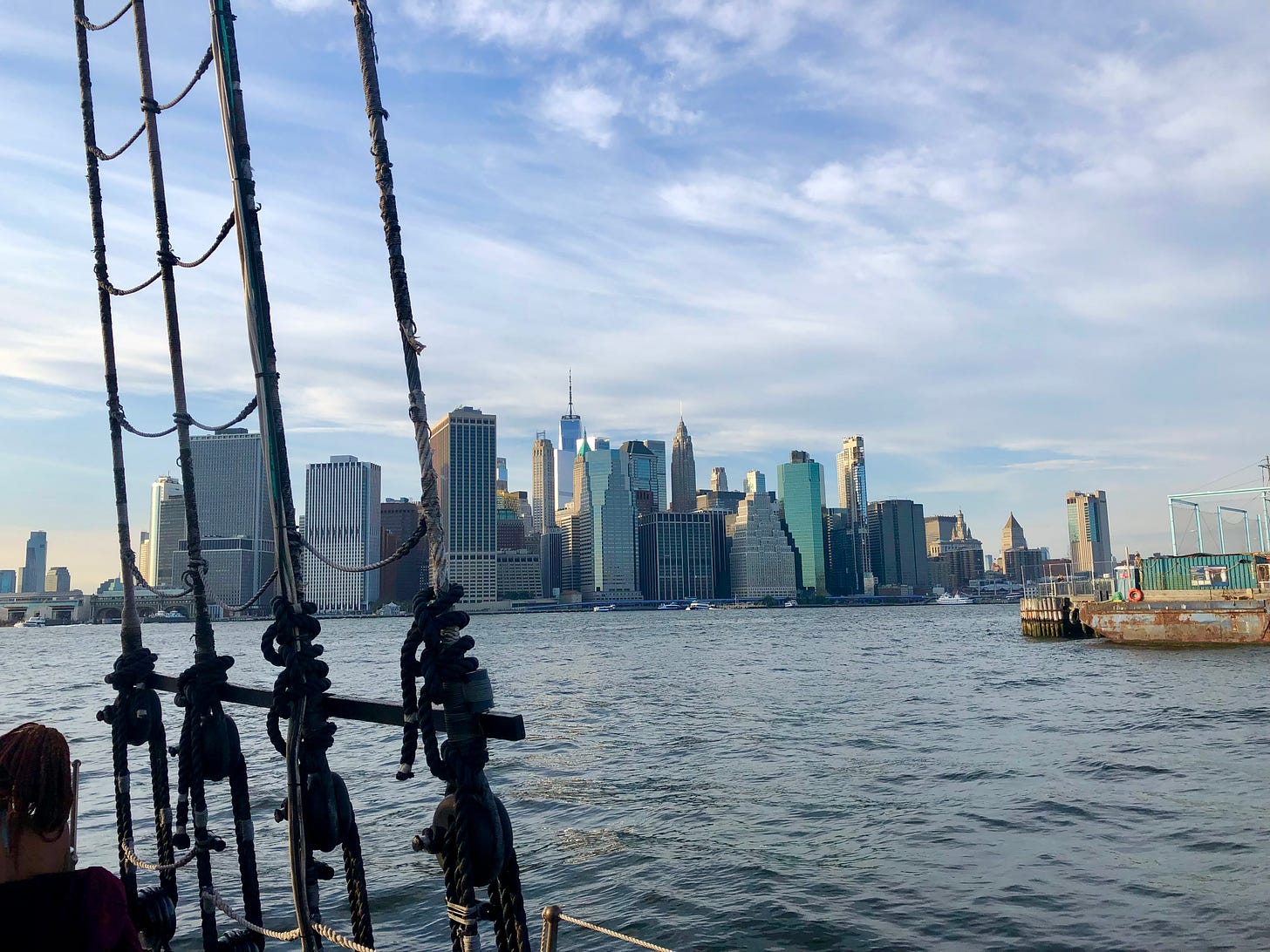
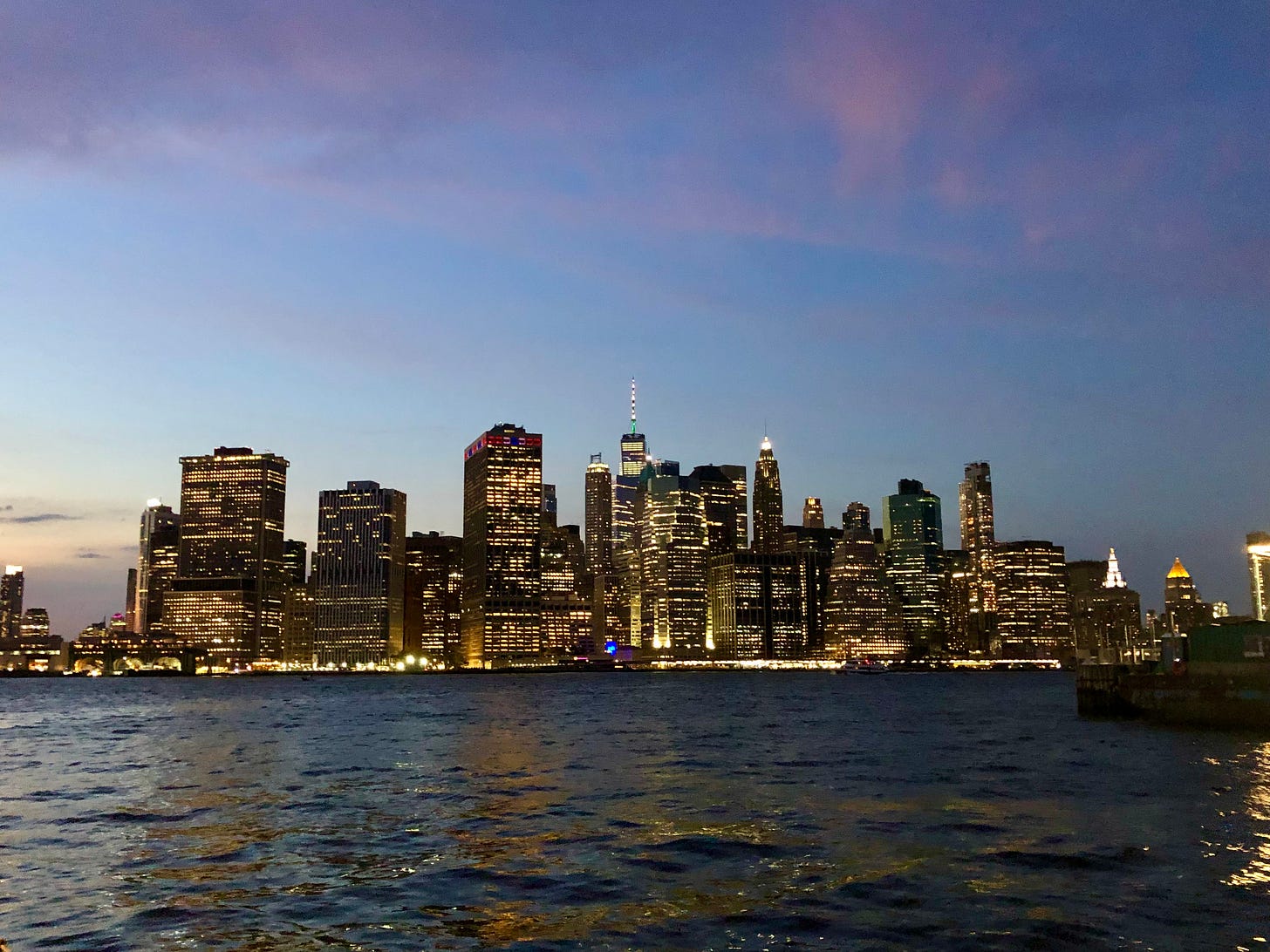
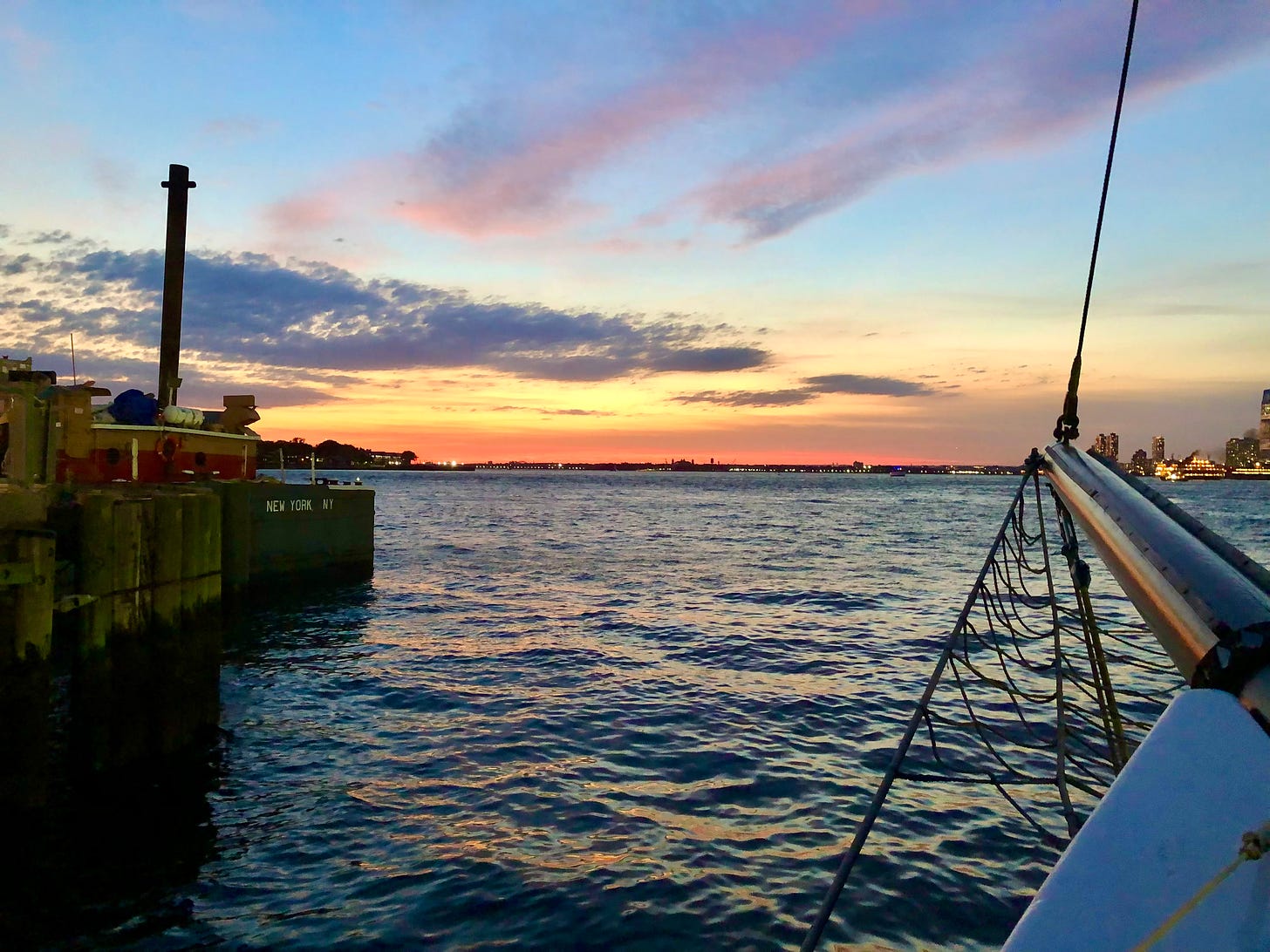
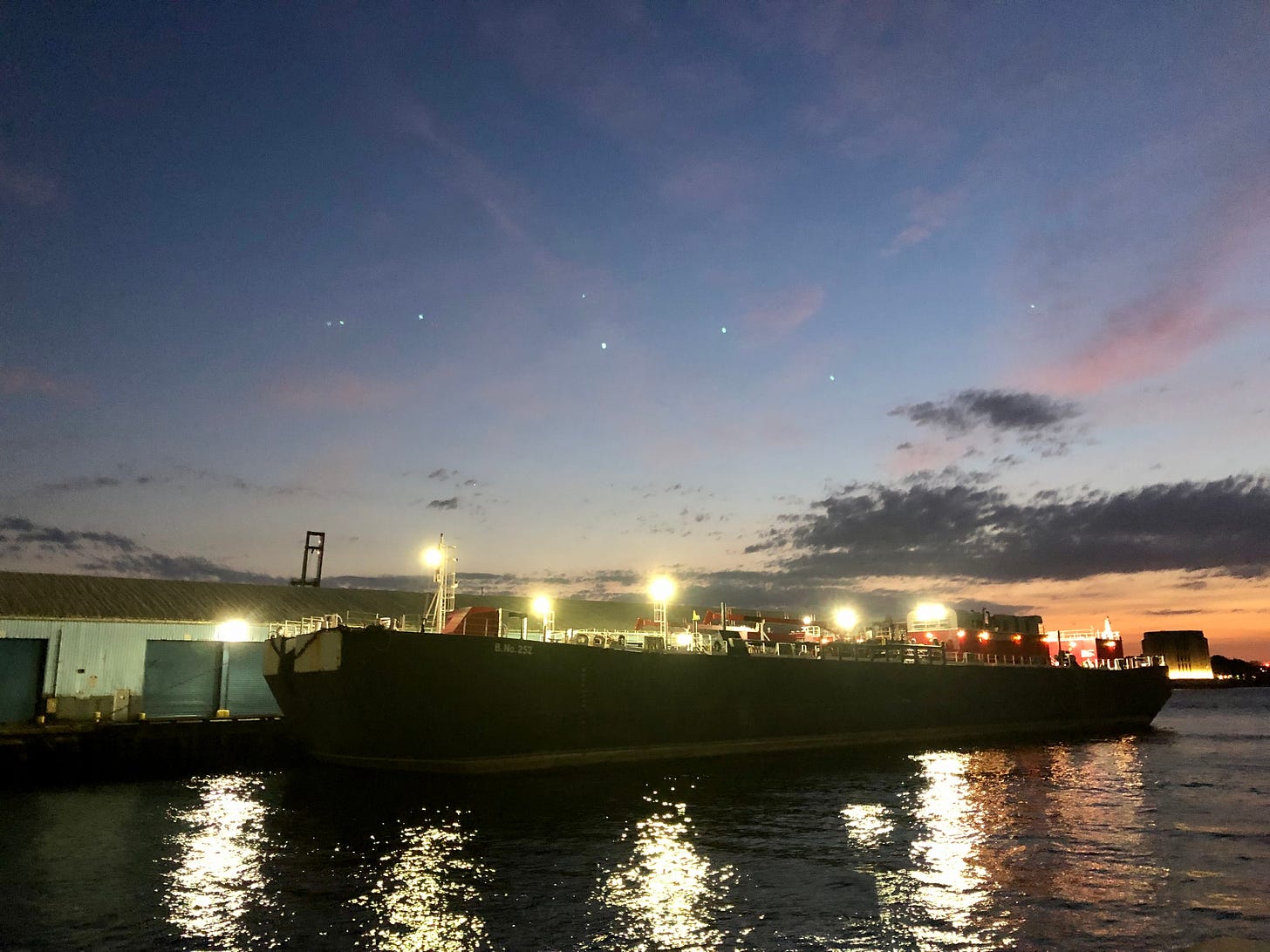
We've made promises to ourselves here in CT to get to the outdoor places at least once more before they shut down---one last hot dog from our local truck, one last lobster roll from the odd little garden center that absolutely crushes the CT lobster roll, one last everything. Looks like this week's weather will cooperate with that! Loved this conversation. I've add Delia's book to my to-read list.
Loved the part about achieving your dreams for one part of your life, and the joy that brings but also needing to fill out the rest of life.